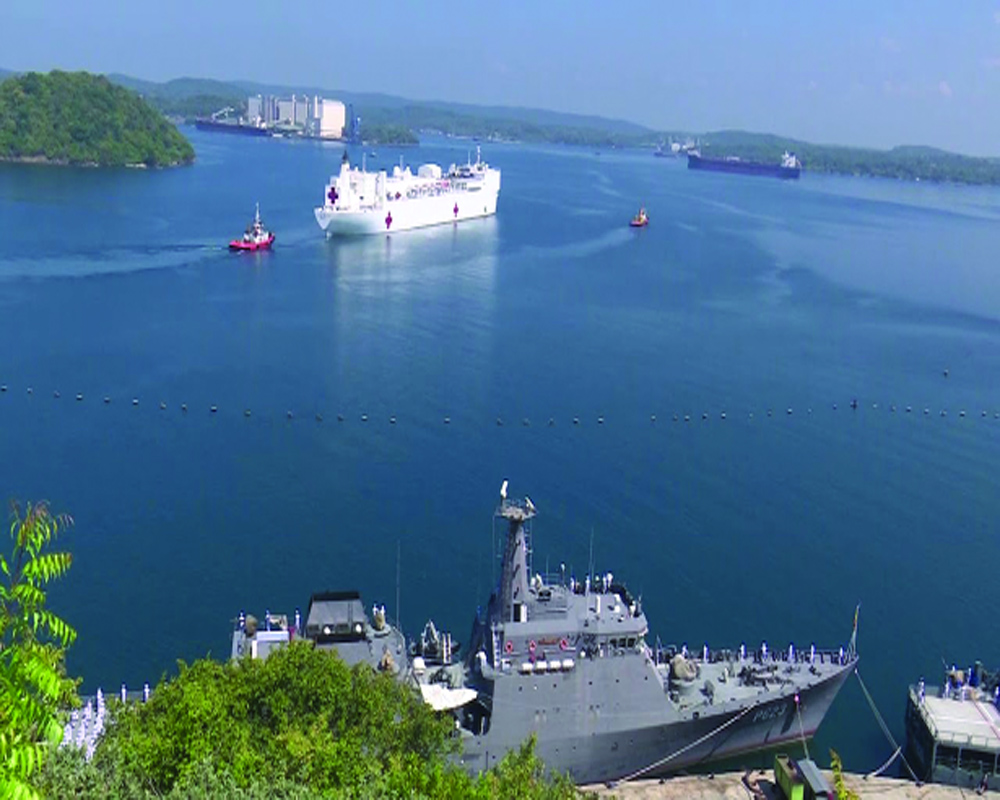The gritty little nation is gasping for survival in the face of a never-before economic crunch, and India must do what it can to help it out
In the new year, India has seen more official engagement with Sri Lanka than with any other country. The country, which is struggling under legacy debt, is now down to just $2.3bn in foreign exchange reserves. The year opened with Finance Minister Basil Rajapaksa having virtual meetings with Foreign Minister S Jaishankar and Finance Minister Nirmala Sitharaman (he was supposed to travel to Gujarat but the visit was cancelled because of Omicron) and announcing India had agreed to an extension of $400mn to Sri Lanka under the Saarc currency swap arrangement and deferring a loan settlement of $515.2mn by two months. Extending Indian credit facility of $1bn for importing food, essential items and medicine and $500mn for importing fuel from India were reviewed. And most important, a pact to jointly modernise the Trincomalee Oil Tank Farms was signed that is certain to boost confidence of investors, apart from enhancing Sri Lanka’s energy security. Retention of India’s footprint in Trincomalee harbour is strategically vital and is sourced from Indo-Sri Lanka Accord, 1987.
Days after, GL Peiris, Sri Lanka’s Foreign Minister, made no secret of his relief when he returned to Colombo earlier this month bearing additional treasured gifts: $1bn in various lines of credit. Basil Rajapaksa will return to New Delhi later in February to invite India for the BIMSTEC summit meeting and hopefully secure a bit more money.
Lanka has never defaulted on a loan in the past. It has a lot of debt — $4bn is due in 2022 alone. But COVID-19 has led to a drop in foreign remittances and the virtual end of tourism industry, the island’s economic mainstay, reducing the country to penury never seen before. Import curbs, currency depreciation and dollar shortage are driving prices high as the cash-strapped country grapples with a shortage of essentials due to the lack of dollars to finance imports and to shore up foreign exchange reserves. Petrol prices are likely to go up.
The economic pressure the Government is facing is creating different kinds of conflict. Last week, Basil and Central Bank of Sri Lanka (CBSL) Governor Ajith Nivard Cabraal contradicted each other publicly as Basil claimed a team from the IMF would visit ‘soon’ to provide ‘technical advice’ on economic problems, hinting at an eventual loan, but Cabraal dismissed the visit as merely a ‘review’ of the past loans. That the Government is at war with itself on whether to take the easy way out by approaching the IMF or bite the bullet and tap friendly neighbors for cash to keep afloat till the next round of bond repayments falls due is the country’s worst kept secret. For now, the Cabraal school of thought has the upper hand and it believes that with an ‘alternative financial strategy’ Sri Lanka can keep afloat till July when the next round of International Sovereign Bonds (ISB) redemption is due, amounting to $1bn, and then review its options.
No one in south Asia and beyond wants to see Sri Lanka fail as a State. And even though no one is conceding this, there is grudging admiration for the tiny nation’s resilience and determination not to fall into the clutches of multilateral lending agencies like the IMF, unless it is forced to.
To be sure, going to the IMF would end Lanka’s problems at one stroke. The money would come immediately, the country would regain its footing and hopefully, with Omicron receding, tourists would start returning. But the IMF is not going to see its money misused — so before lending, it will insist on a lot of painful structural reform. Many in Lanka are cynical about the IMF’s prescriptions for their country’s economy, and with some justification. Lanka has taken many loans and done everything IMF has asked. So, its elite ask, why is the country still in the same place, living from hand to mouth? India is more than happy to help out its ‘friend and brother’ in its time of difficulty. This is not just cheque book diplomacy. It is about putting things on an even keel in the subcontinent.
China, Sri Lanka’s other ‘brother’, has been a bit mealy-mouthed in extending help. Chinese Foreign Minister Wang Yi visited Sri Lanka on January 9-10 to mark the 65th anniversary of diplomatic relations. During the trip, he met President Gotabaya Rajapaksa and his brother Prime Minister Mahinda Rajapaksa. Both requested China to restructure the debt repayments and a concessionary credit facility for imports. This has created a dilemma for China: It does not want to lose Sri Lanka’s friendship or commercial opportunities but equally is not keen to unilaterally grant Sri Lanka moratoria or debt restructuring that other debt distressed developing countries might cite.
For the moment, Sri Lanka is hanging in that perilous spot between a rock and a hard place. Whatever the past mistakes, whatever the legacy of its history with India, New Delhi must reach out to a country that is gasping for survival. Helping the gritty little country is a national duty in national interest.
(The writer, a retired Major General, was Commander, IPKF South, Sri Lanka, and founder member of the Defence Planning Staff, currently the Integrated Defence Staff. The views expressed are personal.)




























